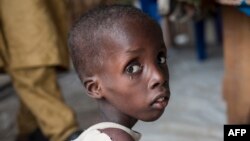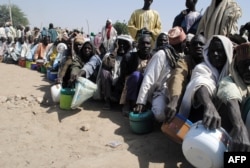The United Nations reports that hundreds of thousands of displaced people in northeastern Nigeria — the epicenter of the Boko Haram insurgency — are suffering from high levels of severe malnutrition. Improved security is enabling aid agencies to finally access the area, which was cut off by the Islamist insurgents.
Much of Borno State in northeastern Nigeria was off limits to aid agencies after Boko Haram gained control of large swaths of the territory in mid-2014.
The Nigerian army and regional forces have now chased the insurgents out of most towns and cities, and Boko Haram controls only four of Borno State’s 27 local government areas.
A spokesman for the U.N. Office for the Coordination of Humanitarian Affairs, Jens Laerke, says returning aid workers describe scenes of destruction and people living under shocking conditions.
He says people are extremely short of food and more than half-a-million people require immediate food assistance.
“These are mainly subsistence farmers who live there. If they are displaced from their land and cannot produce the food that they are supposed to eat," he said. "So, that is of major concern. The security is not ideal, absolutely not … it is still early days for this opening up of these areas.”
Laerke says the Nigerian government and humanitarian organizations are stepping up aid. But, he says the situation in this area is so critical that a much faster and wider response is required.
He says the humanitarian operation is severely underfunded.
“A couple of days ago, the emergency relief coordinator released some $13 million to that particular response," he said. "That is, a kick-starter if you like, hoping very much and urging other donors to follow suit.”
Laerke says the emergency injection of money will provide immediate life-saving food, nutrition and protection assistance to 250,000 people. But, he notes a much larger sum of money — $203 million — is urgently needed to assist the many desperate victims that Boko Haram has created.
Since the insurgency began in 2009, violence in northeastern Nigeria has displaced some 2.4 million people from their homes.














